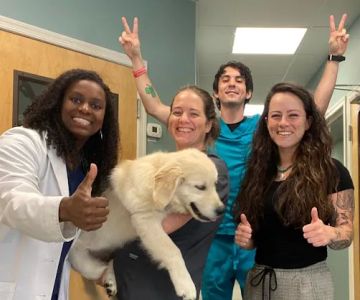Who Invented Veterinary Medicine?
As a pet owner, I've always been curious about the origins of the profession that keeps my furry friends healthy. Veterinary medicine is an essential field, ensuring that animals receive the care and treatment they deserve. However, you might be wondering, who invented veterinary medicine? Well, the answer is more complex than it might seem. It has evolved over centuries, influenced by many key figures and cultures. In this article, I'll take you through the history of veterinary medicine, from its early beginnings to its current status as a crucial part of modern healthcare.
1. The Early Beginnings of Veterinary Medicine
The roots of veterinary medicine can be traced back to ancient civilizations, long before we had modern veterinarians. Early forms of animal care were practiced by the Egyptians, Greeks, and Romans, who recognized the importance of caring for livestock, horses, and other animals. Interestingly, it wasn’t until the late 1600s and early 1700s that the idea of veterinary medicine as a formalized profession began to emerge. Early veterinary practices were often rudimentary, with treatments based on herbal remedies, basic surgeries, and even spiritual healing methods.
1.1 Ancient Egypt: The First Recorded Animal Care
In Ancient Egypt, animal care was highly valued, and the Egyptians were among the first to document veterinary practices. Their medical texts included remedies for treating common animal ailments. While these early practices were not as sophisticated as today’s veterinary science, they laid the foundation for future advancements in animal care.
1.2 Ancient Greece and Rome: The Rise of Veterinary Medicine
The Greeks and Romans advanced veterinary medicine further, particularly in their military and agricultural contexts. Famous figures like Hippocrates and Galen were instrumental in developing medical practices that were later applied to animals. The Romans, in particular, created a system for treating horses that was crucial for warfare, transportation, and agriculture, reflecting their understanding of the importance of animal health.
2. The Birth of Modern Veterinary Medicine
While animal care practices have existed for centuries, the formalization of veterinary medicine as a profession didn't occur until the late 17th and early 18th centuries. One of the key moments in this history was the founding of the first veterinary school in 1761 in Lyon, France, by Claude Bourgelat, who is widely regarded as one of the pioneers of modern veterinary science.
2.1 Claude Bourgelat: The Father of Veterinary Medicine
Claude Bourgelat’s contributions to veterinary medicine are monumental. He founded the first veterinary school in France to combat a major cattle plague that was devastating Europe at the time. His efforts in creating this school helped to establish veterinary medicine as a recognized and respected profession. Bourgelat's work was instrumental in shaping the curriculum for veterinary schools worldwide and is why he's often referred to as the "father of veterinary medicine."
2.2 The Emergence of Veterinary Schools
Following Bourgelat’s establishment of the veterinary school in Lyon, many other veterinary schools were founded across Europe. These institutions became the breeding grounds for the next generation of veterinarians, who would go on to treat and prevent diseases in animals. The first veterinary school in the United States was founded in 1852 at Cornell University, and similar institutions followed suit across North America and Europe.
3. Key Figures in the Development of Veterinary Medicine
As veterinary medicine grew, more individuals contributed to its development, refining practices and expanding knowledge. Some of these figures revolutionized the way we view animal health, while others focused on specific animal species or medical conditions.
3.1 Louis Pasteur: A Revolutionary Contribution
Louis Pasteur is one of the most famous scientists in history, and his work has had a profound impact on both human and animal medicine. His development of the germ theory of disease changed how veterinarians approached diseases, particularly contagious ones. Pasteur’s research led to the creation of vaccines for rabies and anthrax, both of which are still crucial in veterinary medicine today. His pioneering work laid the groundwork for the field of microbiology in animal health.
3.2 James Herriot: The Veterinarian with a Heart
James Herriot, the British veterinarian and author of the beloved "All Creatures Great and Small" series, brought veterinary medicine to the masses. His stories about his experiences treating animals in rural England became a source of inspiration for many aspiring veterinarians. Herriot's work not only showcased the science of veterinary medicine but also the compassion that drives this profession. His books continue to be cherished by readers and veterinary professionals alike.
4. The Evolution of Veterinary Medicine in the 20th and 21st Century
In the modern world, veterinary medicine has continued to evolve. With advancements in technology, diagnostic tools, and medical treatments, veterinarians now have the ability to treat a wider variety of animal diseases and conditions. From routine check-ups to complex surgeries, veterinary medicine has become as sophisticated as human healthcare.
4.1 Veterinary Specializations and Advancements
As veterinary medicine advanced, so did the need for specialization. Today, there are veterinary professionals who specialize in everything from small animal care to exotic pets, large animals, and even wildlife conservation. The development of specialized fields has allowed veterinarians to provide more targeted and effective treatments. Additionally, the use of advanced diagnostic tools, such as MRIs and CT scans, has revolutionized how veterinarians treat animals.
4.2 The Role of Veterinary Medicine in Animal Welfare
Veterinary medicine today plays a crucial role in animal welfare, working to not only treat illnesses but also prevent them. Modern veterinarians are involved in everything from ensuring food safety to protecting endangered species. As awareness about animal welfare grows, veterinary professionals are at the forefront of promoting humane treatment for all animals.
5. Conclusion: The Importance of Veterinary Medicine
As we reflect on the history of veterinary medicine, it's clear that the profession has come a long way since its early days. From ancient practices in Egypt to modern breakthroughs in medical technology, veterinary medicine continues to evolve. Thanks to the contributions of key figures like Claude Bourgelat, Louis Pasteur, and James Herriot, the field of veterinary medicine has not only saved countless lives but has also transformed the way we view and care for animals. Whether you're a pet owner, a veterinarian, or simply interested in the history of animal care, it’s fascinating to see how far the field has come, and I’m excited to see where it will go in the future.











